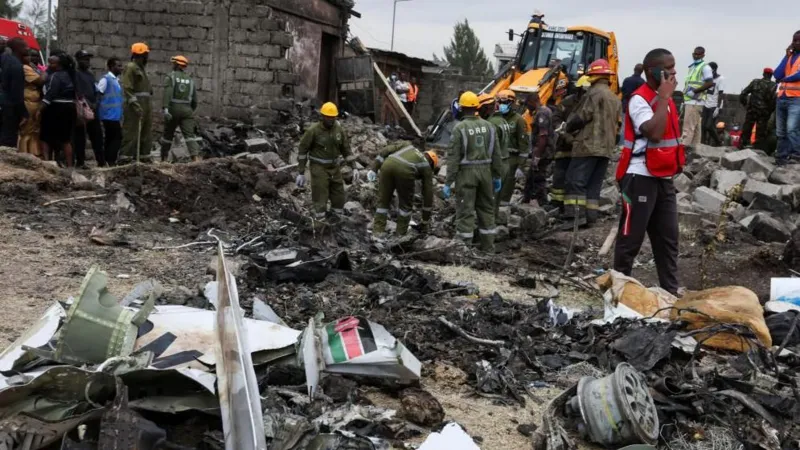UPDATES: Israel-Hamas War
France Puts Focus on Dire Conditions in Gaza

Macron convenes an aid conference on worsening conditions in Gaza.

President Emmanuel Macron of France has insisted that Israel has the right to defend itself after the Hamas attack, but says it needs to follow international laws on protecting civilians in Gaza.Credit...Pool photo by Gonzalo Fuentes
President Emmanuel Macron of France is hoping to secure more humanitarian aid for civilians in Gaza at an international conference in Paris on Thursday as conditions in the territory continue to deteriorate under weeks of bombardment by Israel.
The goal of the conference is to assess the situation in Gaza with international organizations working there and to find ways of improving access to humanitarian aid. An Israeli siege in response to the Oct. 7 attacks by Hamas has kept food, water and medicine from entering the enclave until recently, and humanitarian groups have said far more is needed and that fuel is running desperately low.
Many civilians fear for their safety daily, even in United Nations-run shelters, some of which have been damaged in Israeli strikes.
Mr. Macron has repeatedly insisted that Israel has the right to defend itself after the attack by Hamas, which has been the governing power in Gaza since 2007, but that it needs to follow international humanitarian law and do as much as possible to spare civilians.
Participants at the conference — which was hastily convened on top of a separate, long-scheduled meeting, the Paris Peace Forum — are also expected to discuss how to secure the release of hostages held by Hamas.
Mr. Macron spoke on Tuesday with Prime Minister Benjamin Netanyahu of Israel, and French officials have been coordinating the conference’s agenda with their Israeli counterparts. But Israel — which has rebuffed calls for a cease-fire or a “humanitarian pause” — is not sending a representative.
Amnesty International, one of several nongovernmental organizations that have called for an immediate cease-fire, said in a statement on Wednesday that it welcomed Mr. Macron’s decision to hold the conference. But it called on participants to demand an immediate cease-fire and the lifting of the siege and a longstanding blockade against Gaza, saying those steps were “required for the delivery of any sustained, effective and impactful humanitarian aid.”
The conference will also aim to secure funding for humanitarian aid, the French presidency said. The United Nations said last week that it needed $1.2 billion to fund humanitarian efforts for Palestinians through the end of the year.
France plans to significantly increase its financial contributions, the presidency said, and is also working to determine how France and other European countries could take in wounded or sick Palestinian civilians.
Conference attendees are expected to include officials from UNRWA, the U.N. agency that helps Palestinian refugees, and the International Committee for Red Cross, both of which work in Gaza, along with top European Union officials and several senior European leaders. The Palestinian Authority is expected to be represented by Mohammad Shtayyeh, the prime minister, and the United States by Uzra Zeya, the under secretary of state for civilian security, democracy and human rights.
— Aurelien Breeden reporting from Paris
Hamas is discussing conditions for freeing a few hostages, officials say.

Posters of the faces of children during a rally in Jerusalem. In the center, a boy is seen in tears.
Around 240 hostages are believed to be held by Hamas and other Palestinian groups in Gaza.Credit...Sergey Ponomarev for The New York Times
Discussions are underway for Hamas to release a small number of hostages, including some Americans, in return for a short pause in Israel’s military campaign in Gaza, according to officials briefed on the discussions.
Under the terms being negotiated, Hamas would release up to 15 hostages and Israel would pause attacks on Gaza for three days, which would allow time for humanitarian aid to be shipped into the enclave and hostages to be transported out, according to one person briefed on the discussions.
Other officials confirmed the outlines of a deal but declined to discuss the specific numbers of hostages being discussed. Hamas, the group that controls the Gaza Strip and staged the surprise attack on Israel on Oct. 7, and other Palestinian groups are believed to be holding more than 240 hostages.
William J. Burns, the C.I.A. director, has been helping facilitate the talks, according to U.S. officials. Mr. Burns is currently visiting countries in the Persian Gulf and is expected to continue his work on the hostage issue, according to the people briefed on the hostage negotiations.
John Kirby, a spokesman for the National Security Council, declined to discuss the negotiations but said there had been a couple of humanitarian pauses that allowed people, including hostages, to leave Gaza.
“This is not a new idea, but it is something that we believe should continue to be pursued,” Mr. Kirby said.
The new proposal would free Israeli female civilians and children, and people from other countries, including Americans, taken by Hamas on Oct. 7 when the group attacked Israel. It is not clear how many Americans might be released.
Qatar is playing a role in the mediation, as it did in two earlier hostage releases.
In recent days, American officials, including Antony J. Blinken, the secretary of state, who was in the Middle East last week, have intensified their push for a deal that would involve trading hostages for a pause in the fighting.
On Wednesday, Vedant Patel, a State Department spokesman, said that about 10 Americans remained unaccounted for in the Hamas massacre last month.
“We have been working around the clock to determine the whereabouts of these hostages,” he said.
But Mr. Patel declined to discuss either Qatar-mediated talks or any U.S. involvement in the negotiations.
U.S. officials and others briefed on the discussions said Hamas had previously made an offer to release a group of hostages. Those conversations took place right before the Israeli military entered Gaza. But Israeli officials doubted Hamas sincerity and went ahead with their ground operation.
Still, U.S. officials said discussions continued even after Israeli forces surrounded Gaza City.
Qatar has been deeply involved in the hostage negotiations. The political leaders of Hamas are based in Doha. And the Qatari government has regular discussions with Israel, Hamas and the United States.
The Biden administration has not pressed Qatar to close down the Hamas office because Mr. Blinken and other American officials believe it is useful for hostage negotiations, a U.S. official said.
At a news conference with Mr. Blinken on Oct. 13, the prime minister and foreign minister of Qatar, Mohammed bin Abdulrahman bin Jassim Al Thani, said the office was “a way of communicating and bringing peace and calm into the region.”
Lisa Friedman in Washington contributed reporting.
— Julian E. Barnes and Edward Wong reporting from Washington
Houthi rebels shot down a U.S. drone off Yemen, the Pentagon says.

An American MQ-9 Reaper drone in Catania, Italy, last year. Iran-backed Houthi rebels shot down this type of drone off the coast of Yemen on Wednesday, the Pentagon said.Credit...Fabrizio Villa/Getty Images
A U.S. military surveillance drone was shot down off the coast of Yemen on Wednesday by Iran-backed Houthi rebels, the Pentagon said.
Pentagon officials, speaking on the condition of anonymity to discuss operational matters, confirmed that the drone, an MQ-9 Reaper, had been shot down. But they would not say if the aircraft was armed, where it was flying from or other details.
The downing of a Reaper drone, the mainstay of the American military’s aerial surveillance fleet, was the latest escalation of violence between the United States and Iran-backed groups in Yemen, Iraq and Syria. The episodes have underscored the risks that the conflict between Israel and the Palestinian group Hamas could spiral into a wider war.
On Oct. 19, a U.S. Navy warship in the northern Red Sea shot down four cruise missiles and more than two dozen drones launched from Yemen that the Pentagon said might have been headed toward Israel.
Yemen’s Houthi militia claimed it had attempted an attack on southern Israel on Oct. 31, saying it had launched a “large batch” of ballistic and cruise missiles, as well as drones, toward Israeli targets. The Israeli military said its aerial defense system had intercepted a surface-to-surface missile fired toward Israel “from the area of the Red Sea.” It said it had also intercepted other “aerial threats” in the area, none of which entered Israeli territory.
The Defense Department said on Wednesday that there had been at least 41 attacks on U.S. forces in Syria and Iraq by Iran-backed militias since Oct. 17. At least 46 U.S. service members have been injured, 25 of whom suffered traumatic brain injuries, the Pentagon said.
— Eric Schmitt reporting from Washington
The White House condemns Rashida Tlaib’s embrace of the phrase ‘river to the sea.’

Representative Rashida Tlaib of Michigan, center, during a vigil commemorating one month since the Hamas terror attack on Israel, outside the House of Representatives on Tuesday.Credit...Tom Brenner for The New York Times
The White House on Wednesday condemned Representative Rashida Tlaib for embracing a phrase used by some pro-Palestinian groups, a day after the House censured her for her statements regarding the Israel-Hamas war.
The White House was referring specifically to the phrase “from the river to the sea,” a slogan widely regarded as a rallying cry for the eradication of Israel.
Ms. Tlaib, the only Palestinian American in Congress, has said the slogan is “an aspirational call for freedom, human rights and peaceful coexistence, not death, destruction or hate.” Pro-Palestinian protesters used the slogan in a video Ms. Tlaib recently posted online that accused President Biden of supporting genocide in the Gaza Strip.
“When it comes to the phrase that was used, ‘from the river to the sea,’ it is divisive, it is hurtful, many find it hurtful and many find it antisemitic,” said Karine Jean-Pierre, the White House spokeswoman, on Wednesday. “We categorically reject applying that term to the conflict.”
The House passed a resolution Tuesday evening to censure Ms. Tlaib, a Democrat from Michigan, for embracing that phrase and “promoting false narratives” surrounding Hamas’s Oct. 7 attack on Israel that killed about 1,400 people, mostly civilians.
A video that Ms. Tlaib released Friday said that Mr. Biden “supported the genocide of the Palestinian people,” and she warned the president, who is from her own party, that “we will remember in 2024.”
A genocide is defined as the deliberate and systematic killing of members of a particular ethnic, national, racial or religious group in order to destroy that group. The Israeli military has said it is targeting Hamas, which carried out terrorist attacks on Israeli civilians, not the Palestinian people.
The White House did not comment on the video last week and on Wednesday Ms. Jean-Pierre declined to comment on the House’s censure.
“We respect that there are strong feelings about the war,” Ms. Jean-Pierre said. “We have expressed our views ourselves in public and in private conversations with Israeli officials.”
But, she added, “Remember, Israel is defending itself from terrorists.”
The censure resolution, which passed 234 to 188, with 22 Democrats voting in favor, cited Ms. Tlaib’s use of the phrase “from the river to the sea,” which the Anti-Defamation League deems antisemitic. The resolution called the phrase “a genocidal call to violence to destroy the state of Israel and its people to replace it with a Palestinian state extending from the Jordan River to the Mediterranean Sea.”
Kayla Guo contributed reporting.
— Lisa Friedman reporting from Washington







